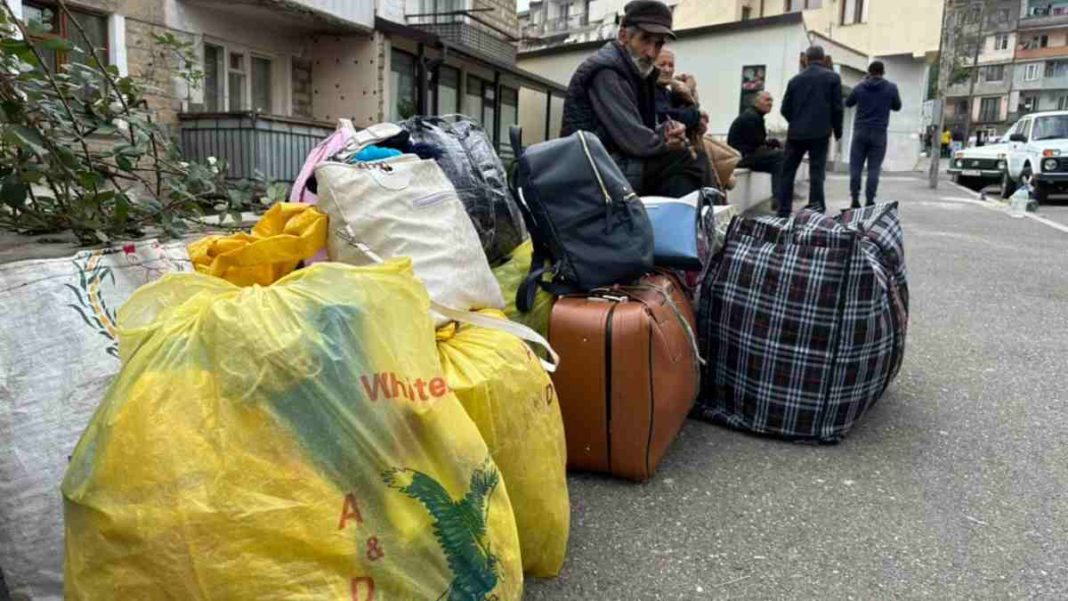ARMENIA: A growing number of ethnic Armenian refugees are fleeing Nagorno-Karabakh following its seizure by Azerbaijan last week.
Over 13,000 people have already entered Armenia from the enclave, which is home to mainly 120,000 ethnic Armenians.
The government of Yerevan’s announcement of plans to relocate those rendered homeless as a result of the conflict was what started the exodus.
Armenia’s Prime Minister, Nikol Pashinyan, has expressed concerns about ongoing ethnic cleansing in the area, stating, “That’s happening just now, and that is a very unfortunate fact because we were trying to urge the international community on that.”
Azerbaijan has stated it wants to reintegrate ethnic Armenians as “equal citizens” in the region.
Representatives from Armenia and Azerbaijan are scheduled to participate in EU-supported discussions in Brussels later today, marking the first such talks since the seizure of Nagorno-Karabakh.
The US State Department’s spokesperson, Matthew Miller, has called on both sides to work towards a lasting peace agreement.
Meanwhile, in Stepanakert, the main city in Karabakh, an explosion at a petrol station has reportedly resulted in severe injuries to over 200 individuals, according to local human rights ombudsman Gegham Stepanyan’s post on the platform formerly known as Twitter.
The cause of the explosion remains unclear.
As refugees continue to escape the region, significant traffic congestion has been observed at the Armenian border.
The central square in Goris is teeming with people, while the nearby theatre has been repurposed to serve as a Red Cross facility.
In the neighbouring village of Kornidzor, refugees undergoing processing expressed their lack of confidence in their safety under Azerbaijani rule and held little hope of returning to their homes.
On Sunday, the Armenian government issued a statement stating that it had already provided government-funded housing to hundreds of refugees.
However, there is no clear plan outlined for handling the potential influx of people. Prime Minister Pashinyan had previously announced last week that preparations were in place to support up to 40,000 refugees.
On Monday, over 140 individuals were reportedly detained in Yerevan during the recent anti-government protests, as reported by local media citing the country’s interior ministry.
Police presence remained heightened outside the primary government building, which accommodates the prime minister’s offices and has been a focal point for demonstrators attempting to gain access.
The protests initially erupted last week due to concerns about the government’s management of the situation in Nagorno-Karabakh.
Pashinyan faces accusations of conceding too much to Azerbaijan, leading to calls for his resignation.
In response to a swift Azerbaijani military offensive, Armenian separatist forces in the region agreed to disarm on Wednesday.
Armenia has consistently stated that any large-scale exodus from the area would be the responsibility of Azerbaijani authorities.
In a television address on Sunday, PM Pashinyan stated that many inside the enclave would “see expulsion from the homeland as the only way out” unless Azerbaijan provided “real living conditions” and “effective mechanisms of protection against ethnic cleansing”.
He reiterated his government’s willingness to “lovingly welcome our brothers and sisters”.
Nagorno-Karabakh, a mountainous region in the South Caucasus, is internationally recognised as part of Azerbaijan but has been under the control of ethnic Armenians for the past three decades.
Armenia has supported this enclave, and it has also received support from its ally, Russia, which has maintained a presence with hundreds of soldiers in the region for many years.
Last week, as Azerbaijan’s army advanced into Nagorno-Karabakh, there were casualties on all sides, including the loss of five Russian peacekeepers, along with over 200 ethnic Armenians and several Azerbaijani soldiers.
Azerbaijan’s defence ministry announced on Sunday that it had seized additional military equipment, including a significant quantity of rockets, artillery shells, mines, and ammunition.
Despite Azerbaijan’s public assurances, concerns persist about the well-being of Nagorno-Karabakh’s residents. Only one aid delivery of 70 metric tonnes of food has been allowed since separatists agreed to a ceasefire and disarmament.
Ethnic Armenian leaders report that thousands are without food or adequate shelter, with many forced to sleep in basements, school buildings, or outdoors.
Also Read: Azerbaijan Initiates New Military Campaign in Nagorno-Karabakh, Calls for Surrender



